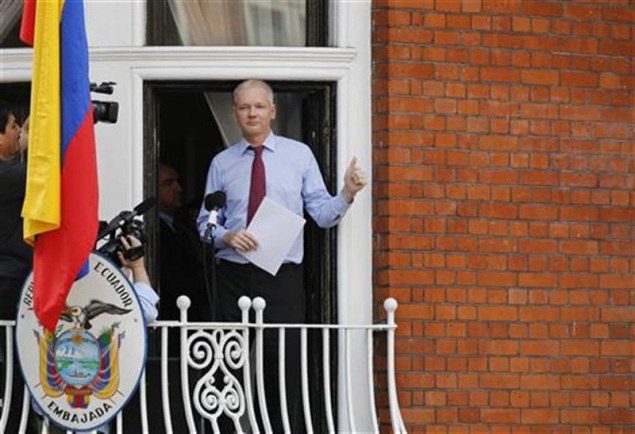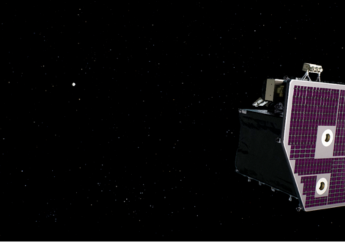- Home
- Internet
- Internet News
- WikiLeaks' Assange sees up to a year in Ecuador embassy
WikiLeaks' Assange sees up to a year in Ecuador embassy

The former computer hacker has been holed up at the embassy for more than two months, seeking to avoid being sent to Sweden for questioning over rape and sexual assault allegations and triggering a diplomatic spat with Britain.
Talks over Assange's fate resumed this week, and Ecuador's government said it was optimistic it will be able to strike a deal with Britain for Assange to receive guarantees he would not be further extradited from Sweden to the United States.
Ecuador granted him asylum earlier this month saying that it shares his fears that he could face charges in the United States over the publication in 2010 by WikiLeaks of thousands of secret U.S. diplomatic cables.
"I think the situation will be solved through diplomacy. The Swedish government could drop the case. I think this is the most likely scenario. Maybe after a thorough investigation of what happened they could drop the case," Assange told Ecuador's Gama television network in comments dubbed into Spanish.
"I think this will be solved in between six and 12 months; that's what I estimate," he said in the interview, which was recorded earlier this week inside the embassy.
Britain says it is legally obliged to extradite Assange to Sweden, and that it will not allow the 41-year-old Australian to leave the embassy and travel to the South American country.
But Ecuador's Foreign Minister Ricardo Patino said on Wednesday he was optimistic the British government would agree to give Assange written guarantees that he would not be extradited from Sweden to any third country.
Ecuador has said that if Assange received such assurances, he would decline its offer of asylum and hand himself over to Swedish prosecutors. Asked during the interview if he could travel to Sweden under those conditions, he was non-committal.
"At some point, if the way has been paved it would not be correct to hold me in prison (in Sweden) without charges."
He did not mention the allegations of rape and sexual assault made against him by two WikiLeaks supporters in 2010.
A veiled British threat to enter the embassy to arrest Assange angered Ecuador's President Rafael Correa. But the leftist leader said last weekend that the threat had later been lifted and he considered the "unfortunate incident" over.
In another sign of thawing tensions, Ecuador's Vice President Lenin Moreno met British Foreign Secretary William Hague on Wednesday, but any deal looks likely to take time.
"Given Ecuador's position on what they call diplomatic asylum and our very clear legal position, such a solution is not in sight at the moment," Hague told the BBC on Thursday.
Copyright Thomson Reuters 2012
For details of the latest launches and news from Samsung, Xiaomi, Realme, OnePlus, Oppo and other companies at the Mobile World Congress in Barcelona, visit our MWC 2026 hub.
Related Stories
- Samsung Galaxy Unpacked 2026
- iPhone 17 Pro Max
- ChatGPT
- iOS 26
- Laptop Under 50000
- Smartwatch Under 10000
- Apple Vision Pro
- Oneplus 12
- OnePlus Nord CE 3 Lite 5G
- iPhone 13
- Xiaomi 14 Pro
- Oppo Find N3
- Tecno Spark Go (2023)
- Realme V30
- Best Phones Under 25000
- Samsung Galaxy S24 Series
- Cryptocurrency
- iQoo 12
- Samsung Galaxy S24 Ultra
- Giottus
- Samsung Galaxy Z Flip 5
- Apple 'Scary Fast'
- Housefull 5
- GoPro Hero 12 Black Review
- Invincible Season 2
- JioGlass
- HD Ready TV
- Latest Mobile Phones
- Compare Phones
- Apple iPhone 17e
- AI+ Pulse 2
- Motorola Razr Fold
- Honor Magic V6
- Leica Leitzphone
- Samsung Galaxy S26+
- Samsung Galaxy S26 Ultra
- Samsung Galaxy S26
- MacBook Pro 16-Inch (M5 Max, 2026)
- MacBook Pro 16-Inch (M5 Pro, 2026)
- Apple iPad Air 13-Inch (2026) Wi-Fi + Cellular
- Apple iPad Air 13-Inch (2026) Wi-Fi
- Huawei Watch GT Runner 2
- Amazfit Active 3 Premium
- Xiaomi QLED TV X Pro 75
- Haier H5E Series
- Asus ROG Ally
- Nintendo Switch Lite
- Haier 1.6 Ton 5 Star Inverter Split AC (HSU19G-MZAID5BN-INV)
- Haier 1.6 Ton 5 Star Inverter Split AC (HSU19G-MZAIM5BN-INV)















